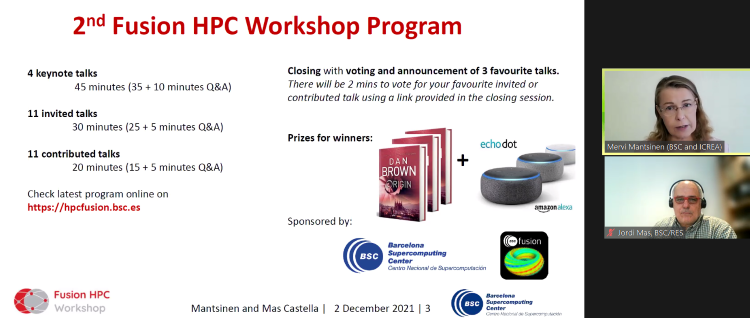
The 2nd Fusion HPC Workshop took place in the online format on December, 2nd and 3rd, with 217 registered participants from 31 countries all over the world. The event was organized by our Fusion group and Barcelona Supercomputing Center (BSC) under the auspices of the Spanish Supercomputing Network (RES) and in close collaboration with the international programme committee with several experts from our collaborator institutions.
The workshop covered all computer applications using High Performance Supercomputing (HPC) in the field of fusion research, giving an overview of the overall state of the research of the large scale fusion projects such as ITER and EUROfusion, as well as of the specific and most common lines of the research of fusion phenomena simulations (energy and particle transport, multi-physics modelling, plasma processes, heating, fueling and current drive, laser-plasma interactions, scenario development and control, fusion reactor materials, fusion reactor technology, etc.). The full program of the event is available here.
Day 1. December, 2nd
The event was opened by a welcome by Prof. Dr. Mervi Mantsinen, ICREA researcher, PI of FusionCAT project and leader of our Fusion group at the BSC, and Dr. Jordi Mas Castella from BSC and RES.
Thereafter, Prof. Mantsinen chaired the first session of the talks. The first speaker of the session was Prof. Dr. Frank Jenko, Scientific Member and Director at the Max Planck Institute of Plasma Physics (IPP), who talked in his keynote speech about the needs and challenges in the fusion energy research and the huge role of the comprehensive and realistic computations on clusters and supercomputers in the field. He, then, provided an overview of the research plans for the time frame until about 2025, including some to-be-expected breakthroughs on the horizon, which are bound to help accelerate the development of fusion energy through HPC.
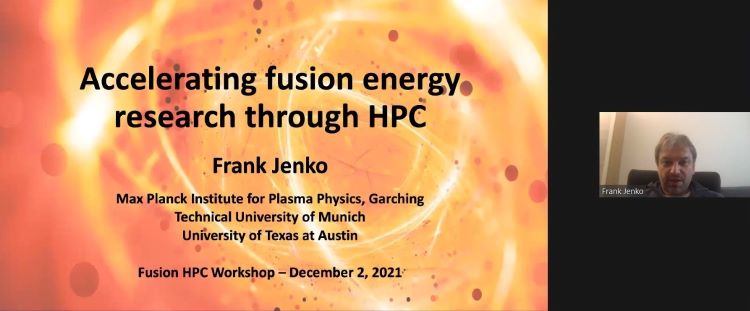
The second speaker in the first session was Prof. Dr. Kenji Imadera from the Graduate School of Energy Science at Kyoto University. The topic of his invited talk was 5D full-f gyrokinetic simulations with HPC infrastructures.
During the second session, chaired by Dr. Julio Gutierrez (BSC), three invited speakers presented their talks, among which there was a member of our Fusion group, Dr. Pedro Bonilla. In his invited talk he covered the main aspects of the simulation of multi-physics fusion phenomena with the multipurpose HPC software Alya. He showed that the integration of the multi-physics models is key to understand how the different physics processes that take place in the fusion reactors affect each other. The current state of the development of the main Alya modules applied to fusion and the test cases for validation of these modules were highlighted in his presentation.
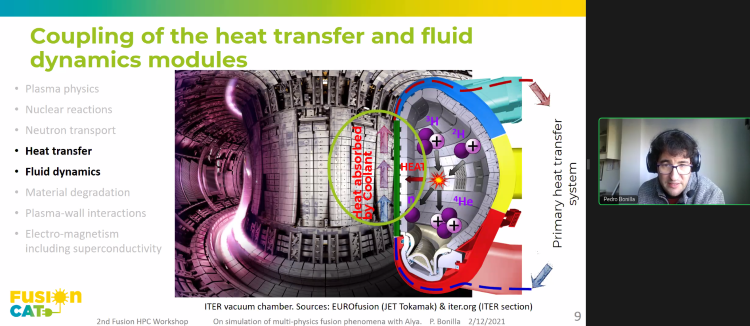
The third session, chaired by Dr. Shimpei Futatani (UPC), was opened by a keynote talk of Dr. Marina Becoulet, Senior Research Physicist at the French Atomic Energy Commission (CEA/IRFM) and Research Director and International Expert of CEA in theory and modelling of magnetic fusion plasmas. In her keynote, the first principles modelling of magnetohydrodynamic (MHD) instabilities and their control in magnetic fusion devices using HPC techniques were covered. This was followed by an overview of the recent non-linear MHD modelling results of Edge Localized Modes (ELMs) and their control by Resonant Magnetic Perturbations (RMPs) in ITER after the validation of the model in the existing machines. The session was followed by the talks of three invited participants.
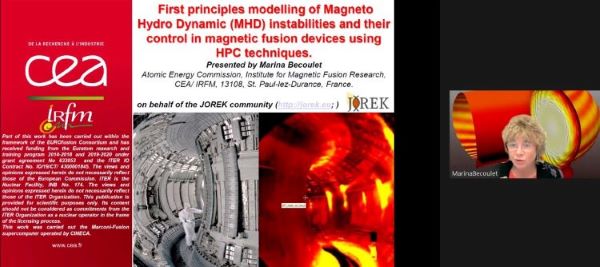
The last session of the day was chaired by Dr. Alejandro Soba (CNEA/CONICET) and consisted of five invited talks, among which the following two were given by the members of our group: Dr. Ezequiel Goldberg spoke about the development of high fidelity deterministic neutron transport modelling and explained the progress that has been made with the Alya neutronics module NEUTRO, and Mr. Oriol Fernández covered the state of the development of the Alya module MAGNET – the tool for Type-II High-Temperature Superconductors (HTS) simulations.
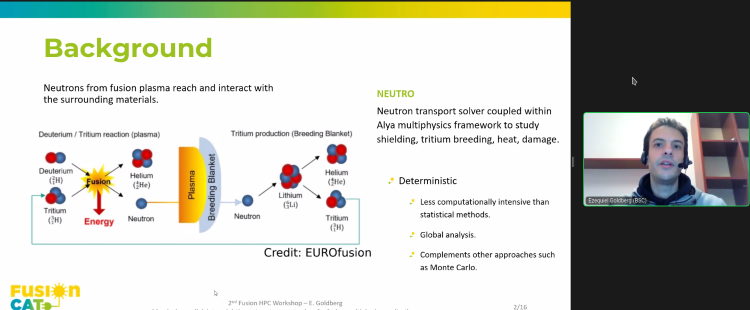
All the talks were followed by short Q&A.
Day 2. December, 3rd
The second day consisted of three sessions. The first session, chaired by Dr. Edilberto Sánchez (CIEMAT), was opened by the talk of Prof. Dr. Tomo-Hiko Watanabe from Nagoya University, Theoretical Plasma Physics Laboratory (P Lab). In his talk he presented some cutting-edge results obtained within the simulation project for exploration of burning plasma confinement physics. The three major fusion plasma simulation codes (GKV, GT5D and MEGA) that achieved the high computational performance on the Fugaku supercomputer, were used in the project and data science approaches were also promoted to improve transport modeling and efficiency of the simulation research. It was followed by the presentations of the three invited people and a short break.
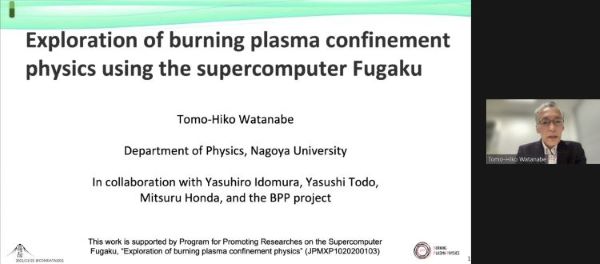
The second session was chaired by Dr. Alejandro Soba (CNEA/CONICET) and included the talks of four invited speakers, the last of whom was a member of our group, Dr. Julio Gutiérrez, with a talk on large-scale modelling of fusion materials.
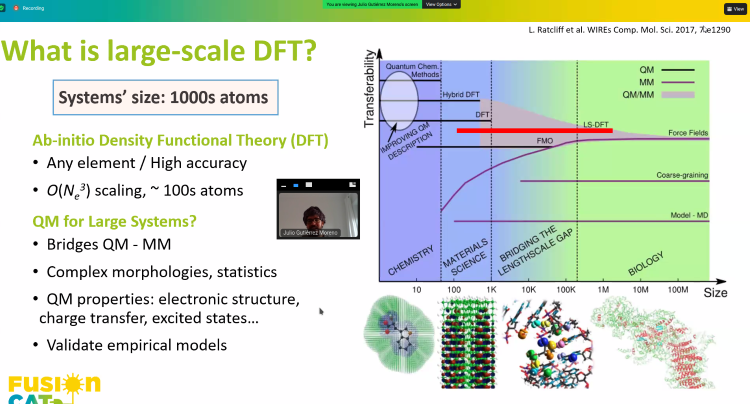
Finally, the last session of the workshop, chaired by Dr. Edilberto Sánchez (CIEMAT), was opened with the keynote talk of Prof. Dr. William Dorland, from the University of Maryland, Department of Physics and Princeton Plasma Physics Laboratory, Princeton. In his presentation he focused on the topic of first principles transport simulations optimized for reactor concept evaluation and for other faster-than-real-time applications. He discussed differences between validation studies and reactor concept evaluation, and between scenario development and reactor concept rejection and showed the possibility to complete a useful first-principles simulation of an ITER discharge in a time shorter than an actual ITER discharge will take place, with modest computational hardware requirements using algorithms designed for such purposes.
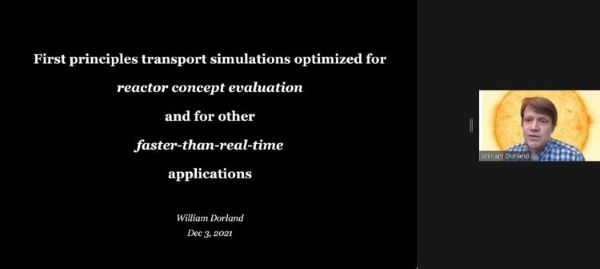
The session was then completed by the talks of the remaining three invited people, and following by the closing ceremony. It started with the voting for the three most popular invited and contributed talks took place. The three winners of the most popular talk awards sponsored by BSC and our group are in alphabetical order: Helen Brooks (CCFE) with the talk about Scalable Multi-physics for Fusion Reactors with AURORA; James Dark (LSPM, CNRS) with the talk about Modelling hydrogen transport in breeding blankets: influence of trapping effects and Hanne Thienpondt (CIEMAT) with the talk about Turbulent heat flux versus density gradient: an inter-machine study with the gyrokinetic code stella.
Finally, Prof. Mantsinen closed the event with sincere thanks to all the speakers as well as the programme and the local organizing committee, the institutions involved and all the participants.
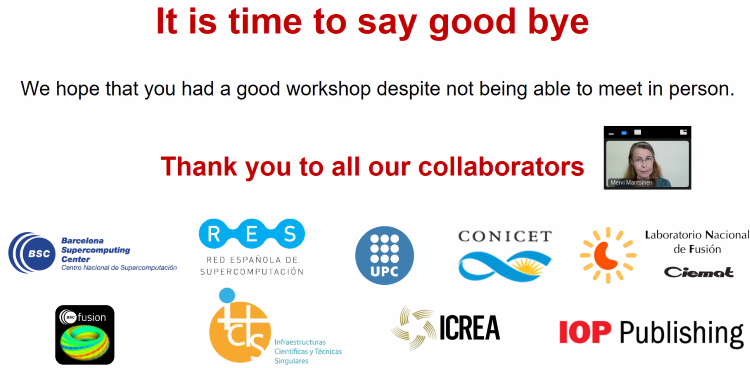
We truly enjoyed the workshop and felt that it gave a good glimpse of the wide range of latest important developments taking place in the field of HPC for fusion. We hope that all the participants had a good experience and we look forward to seeing everyone again at the next edition!


1 thought on “Some highlights from the Fusion HPC Workshop 2021”